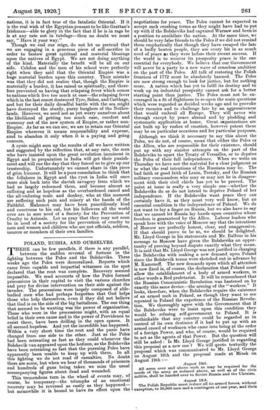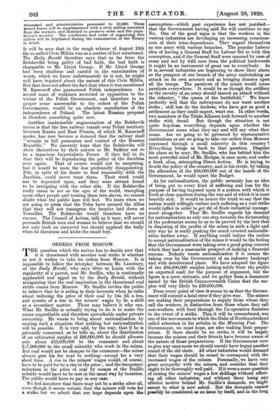POLAND, RUSSIA, AND OURSELVES.
rr HERE can be few parallels, if there is any parallel, between the sudden reversal of fortune in the fighting between the Poles and the Bolsheviks. Three weeks ago the Poles were demoralized. Reports which came from capable and impartial witnesses on the spot declared that the rout was complete. Recovery seemed impossible. We read accounts of how the Poles formed processions in their capital to visit the various churches and pray for divine intervention on their side against the invader. The processions were largely composed of able- bodied men who had perhaps forgotten that God helps those who help themselves, even if they did not believe that God is on the side of the big battalions. The one thing that seemed to be wanting was the power of organization. Those who were in the processions might, with an equal belief in their own cause and in the power of Providence to assist them, have been drilling in the open spaces. It all seemed hopeless. And yet the incredible has happened. Within a very short time the rout and the panic have changed from one side to the other. Just as the Poles had been retreating as fast as they could whenever the Bolshevik van appeared upon the horizon, so the Bolsheviks have been retreating so fast that the pursuing Poles have apparently been unable to keep up with them. In all this fighting we do not read of casualties. No doubt there are some, but when we hear of thousands of prisoners and hundreds of guns . being taken we miss the usual accompanying figures about dead and wounded. This tremendous turn in the wheel of events may, of course, be temporary—the triumphs of an emotional recovery may be reversed as easily as they happened— but meanwhile it is bound to have its effect upon the negotiations for peace. The Poles cannot be expected to accept such crushing terms as they might have had to put up with if the Bolsheviks had captured Warsaw and been in a position to annihilate the nation. At the same time, we should be very false friends to the Poles if we did not remind them emphatically that though they have escaped the fate of a badly beaten people, they are every bit in as much need of peace as they were before their recent success. If the world is to recover its prosperity peace is the one essential for everybody. We believe that our Government will never be a 'party to a new wave of senseless ambition on the part of the Poles. All talk of restoring the Polish frontiers of 1772 must be absolutely banned. The Poles are now strong enough to look for justice, but for nothing more. A nation which has yet to fulfil its destiny and to work up its industrial prosperity cannot ask for a better starting point than justice. The Poles must not be en- couraged in a fit of flightiness to re-open the main questions which were regarded as decided weeks ago and to provoke their enemies and to challenge fate by an aggressiveness that would embroil all Europe. They will never win through except by peace abroad and by plodding and systematic application at home. Great organizations are not built up by rushes of emotion, however potent these may be on particular occasions and for particular purposes.
Although we think it necessary to say this about the Poles, we do not, of course, mean that either the Poles or the Allies, who are responsible for their existence, should put up with any sinister attempts on the part of the Bolsheviks to upset the Treaty of Versailles, or to deprive the Poles of their full independence. When we write on Thursday we have not the material for a clear judgment as to what the real intentions of the Russians may be. The bad faith or good faith of Lenin, Trotsky, and the Russian military commanders who may or may not be in disagree- ment with their civil chiefs has yet to be proved. The point at issue is really a very simple one—whether the Bolsheviks do or do not intend to deprive Poland of her independence. If the Bolsheviks want peace they can certainly have it, as they must very well know, but an essential condition is the independence of Poland. We do not want to lay a finger on Russia, but we also have to say that we cannot let Russia lay hands upon countries whose freedom is guaranteed by the Allies. Labour leaders who speak here with the voice of Moscow say that the intentions of Moscow are perfectly honest, clear, and unaggressive. If that should prove to be so, we should be delighted. Mr. Lloyd George in his statements and Mr. Balfour in his message to Moscow have given the Bolsheviks an oppor- tunity of proving beyond dispute exactly what they mean. It is said that Mr. Lloyd George was not justified in charging the Bolsheviks with making a new demand upon Poland since the Bolshevik terms were sketched out in advance by M. Kameneff. The new demands upon which all attention is now fixed is, of course, the declaration that Poland must allow the establishment of a body of armed workers, in other words a Red proletariat. It will be remembered that the Russian Communistic Revolution was hastened on by exactly this same device—the arming of the " workers." It looks, therefore, when the Bolsheviks require the existence of an armed mob in Poland, as though they want to see repeated in Poland the experience of the Russian Revolu- tion. We thoroughly agree with the Government that if the Bolsheviks were to insist upon this condition they would be refusing self-government to Poland. It is unthinkable that any country could be regarded as in control of its own destinies if it had to put up with an armed crowd of workmen who came into being at the order of a foreign Power, and who, of course, would be required to act as the agents of that Power. But the question will still be asked : Is Mr. Lloyd George justified in regarding this proposal as a new one ? We will quote textually the proposal which was communicated to Mr. Lloyd George on August 10th and the proposal made at Minsk on August 19th :—
August 10th. All arms over and above such as may be required for the needs of the army as reduced above, as well as of the civic militia, shall be handed over to Soviet Russia and the Ulaaine.
August 19:1. The Polish Republic must reduce all its armed forces, without exception, to 50,000 men and a contingent of one year, and theil command and administrative personnel to 10,000. These armed forces will be supplemented with a civic militia recruited from the workers, and destined to preserve order and the popu- lation's security. The conditions and order of organizing this militia will be stipulated during the examination of the Treaty in detail.
It will be seen that in the rough scheme of August 10th the so-called Civic Militia was as a matter of fact mentioned. The Daily Herald therefore says that so far from the Bolsheviks being guilty of bad faith, the bad faith is chargeable to Mr. Lloyd George. If Mr. Lloyd George had been studious and careful in the examination of words, which we know unfortunately he is not, he might well have inquired about the nature of this Civic Militia. But that does not affect the fact that when it was mentioned M. Kameneff also guaranteed Polish independence. An armed mass of workmen recruited in opposition to the wishes of the Polish 'Government, and therefore in no proper sense answerable to the orders of the Polish Government, would be an absolute repudiation of the independence of Poland. The latest Russian proposal is therefore something quite new.
Another inadmissible augmentation of the Bolshevik terms is that the free railway transit over Polish territory between Russia and East Prussia, of which M. Kameneff spoke, has now become a demand that the railway shall " remain in full possession and control of the Russian Republic." We sincerely hope that the Bolsheviks will show themselves by their answer to Mr. Balfour not to be a rapacious Imperialistic Power. If they fail to do that they will be reproducing the policy of the Jacobins over again. That of course would not be surprising, but it would be none the less profoundly disappointing. Pitt, in spite of his desire to deal reasonably with the Jacobins, could never trust them. Their word could not be depended upon, and they were always found to be intriguing with the other side. If the Bolsheviks really mean to act as the ogre of the world, trampling upon other people and turning them into slaves, we cannot doubt what the public here will feel. We learn when we are going to press that the Poles have assured the Allies that they will not transgress the frontier laid down at Versailles. The Bolsheviks would therefore have no excuse. The Council of Action, talk as it may, will never persuade British men and women to believe that we should not only look on unmoved but should applaud the bully when he threatens and kicks the small boy.



































 Previous page
Previous page